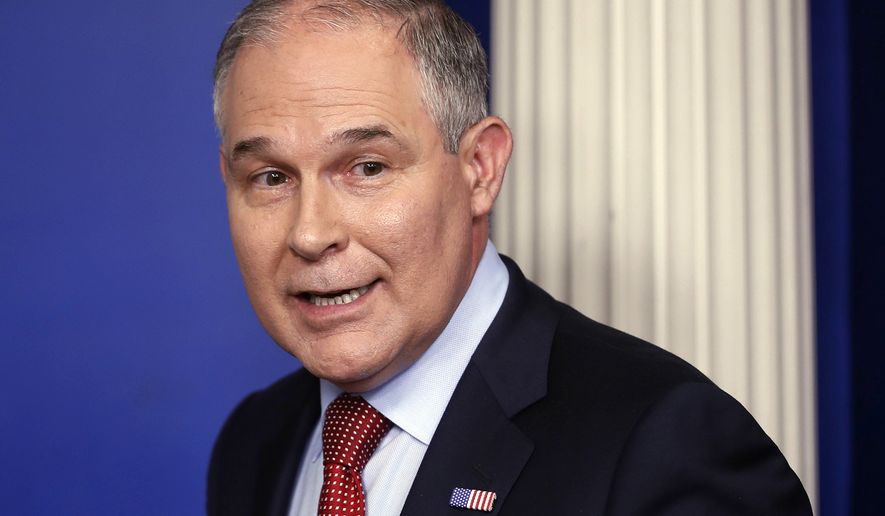As the Trump administration mulls cuts to the federal mandate known as the Renewable Fuel Standard, Congress’s most vocal biofuels champions are urging the government to change course and instead ramp up support for ethanol.
Sen. Charles Grassley, Iowa Republican and perhaps Congress’s top ethanol backer, and other lawmakers met Tuesday afternoon with Environmental Protection Agency Administrator Scott Pruitt on Capitol Hill. The meeting focused heavily on ethanol, and specifically on the EPA’s looming announcement on the latest round of Renewable Fuel Standard (RFS) targets. The EPA is considering lowering annual requirements for advanced biofuels, a move that industry leaders say would be a crushing blow.
This week has brought a concerted effort from Mr. Grassley, fellow federal lawmakers, ethanol industry leaders, and a host of others as they make a last-ditch appeal to Mr. Pruitt, who historically has been highly skeptical of the RFS.
“The industry is poised for growth, in accordance with the intent of the law, if EPA sends the market signals with increased volumes. Reducing volumes and especially those [volume levels] that were previously finalized is disruptive, unprecedented, and very troubling,” reads a letter sent this week Mr. Pruitt and signed by Mr. Grassley and three other senators, including two Democrats.
The RFS, passed by Congress and signed into law by then-President George W. Bush in 2007, requires increasing amounts of biofuels be produced and blended with the nation’s gasoline supply each year. Supporters say the program encourages energy security and directly creates tens of thousands of jobs in Iowa and elsewhere across the country; critics contend it amounts to little more than the government propping up the ethanol industry with an unnecessary mandate that distorts energy markets.
The EPA must finalize the next round of the RFS by the end of November. In a draft proposal released over the summer, the agency put forth several changes deeply opposed by Mr. Grassley.
In the draft, the EPA proposed that a total of 19.24 billion gallons of renewable fuels be blended into gasoline nationwide. Of that, the agency will require that 15 billion gallons of conventional corn-based ethanol be used, a number that’s unchanged from the 2017 figure.
But the EPA lowered the target for more advanced biofuels products, dropping from 4.28 billion gallons this year to 4.24 gallons next year.
The EPA also reportedly is considering allowing ethanol exports to count toward the mandated volumes — a move that opponents say could lead to less ethanol being produced here at home, and would run counter to the core idea of ethanol helping to promote America’s energy independence.
On Wednesday, Iowa Gov. Kim Reynolds, a Republican, will join with other ethanol sector leaders for a press conference in Iowa to address “threats” to the RFS.
In their letter to President Trump this week, Ms. Reynolds and other Midwestern governors appealed to the commander in chief to essentially overrule Mr. Pruitt and stop any cuts to the RFS.
“We write to you now, though, because we are concerned — concerned about where the EPA’s proposed implementation of RFS policy is heading, and concerned about what that will do to our renewable fuel producers, farmers and rural economy,” they wrote in the letter.
Throughout his campaign, Mr. Trump was highly supportive of the RFS and of ethanol more broadly, while Mr. Pruitt was critical of the program when he served as attorney general of Oklahoma. That disconnect has led to some confusion as to exactly how the administration will approach ethanol policy, and has led biofuels advocates to sometimes bypass Mr. Pruitt and appeal to the president directly.
Underscoring how the politics of ethanol divides both parties and often leads to unusual alliances, a coalition of environmental groups this week sent a letter to lawmakers explaining why they agree with Mr. Pruitt and support lower targets for advanced biofuels. The letter was signed by the Sierra Club, the National Wildlife Federation, ActionAid USA, the Clean Air Task Force, and Mighty Earth, a group founded by former Rep. Henry Waxman, California Democrat.
“Biodiesel made from recycled or waste feedstocks can provide a greenhouse gas savings benefit, but the large majority of biodiesel produced and consumed in the United States comes from virgin vegetable oils like soy and canola,” the letter reads in part. “By increasing overall demand for vegetable oils, the RFS raises food prices and spurs increased agricultural production, which in turn causes the destruction of native habitats and pollutes clean water supplies.”
• Ben Wolfgang can be reached at bwolfgang@washingtontimes.com.




Please read our comment policy before commenting.